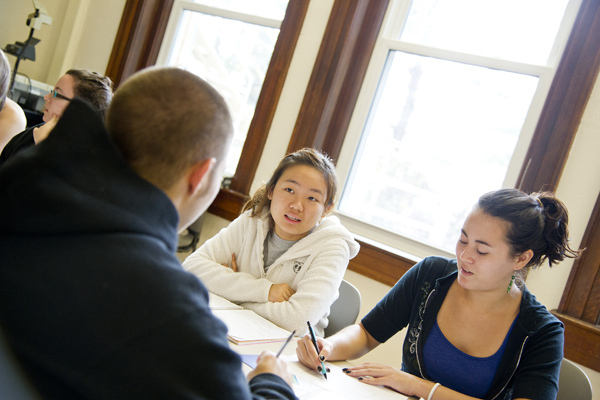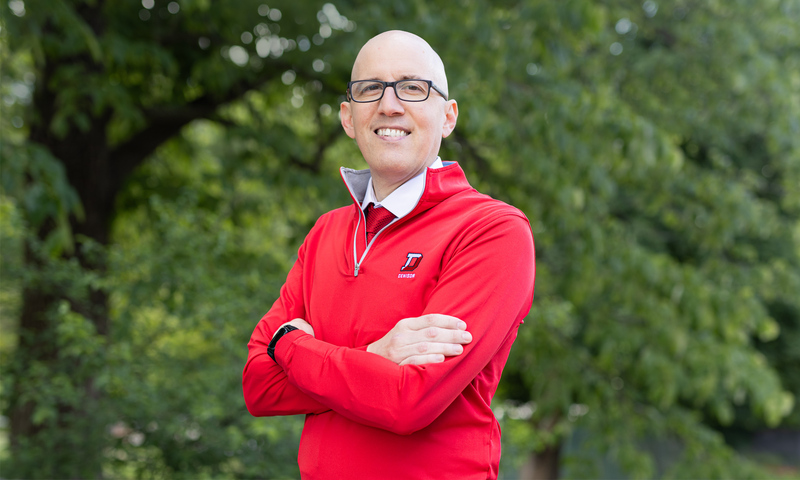In a highly respected national survey of college students, Denison students say that their educational experience is exceptional.
A liberal arts education at Denison University is focused on much more than the accumulation of knowledge through a rigorous academic life. A Denison education takes a whole-person approach that makes connections between the learning that happens in classrooms, labs, and studios, and learning that happens in co-curricular settings via residential life, athletics, service and civic engagement, leadership opportunities, and off-campus activities like study abroad and internships. This form of education instills a life-long desire for learning that often is coupled with a life-long desire for civic engagement.
As part of on-going strategies to evaluate student learning, Denison participates on a regular basis in the National Survey of Student Engagement (NSSE). Overall, 1,574 schools took part in NSSE.
Through NSSE, Denison seniors report that they are participating in a stimulating and personally satisfying education of depth and breadth in the liberal arts that equals or in some cases exceeds that of their peers at similar institutions.
Students report that a Denison education moves well beyond rote memorization and connects students’ scholarship to their experiences and preparation for their lives after graduation.
Our students state strongly that their education prepares them well for future employment. Students have numerous opportunities to conduct research themselves and with members of the faculty, dialogue and engage with people who are different from them, and they give their professors consistently high marks for teaching.
“Denison provides an exceptional educational experience that nurtures the whole person. My identity, ethics, and values have been shaped significantly by my time at Denison,” said one senior. “The campus culture, people, and educational opportunities combine to offer a truly exceptional experience.”
Another Denison senior reported, “The faculty and staff at this institution genuinely care about the well-being and scholastic excellence of each student. I have made more life-long friends at this institution than I would have ever imagined, not only with fellow students, but also with nearly every faculty and staff member I have been associated with.” The student added, “I am proud to be a part of this community, and I am lucky to have attended this college. The aforementioned points illustrate why I have excelled and grown as a student and a well-rounded person since arriving here.”
“Our commitment is to prepare students not merely for an entry-level job, but for a long life of meaningful contribution to their communities and their workplaces,” says Laurel Kennedy, vice president for student development. “Our students are making significant connections in their academic life and in their learning beyond the classroom. These data support that our focus on ‘the whole student’ is transformational for them.”
As these seniors prepare to transition to a working environment, they find that employers are searching for many of the same skills that they report achieving at Denison.
According to an Association of American Colleges and Universities survey of employers, the top attributes employers look for in employees include the ability to think clearly about complex problems, the ability to write and speak clearly, and the ability to work in teams.
Students awarded their experience at Denison top marks for contributing to knowledge, skills and personal development. Indeed, students indicate that, especially with regard for the first three criteria noted below, their outcomes at Denison are significantly better than other schools “often” or “very often” in:
- thinking critically and analytically (100 percent)
- writing clearly and effectively (92 percent)
- speaking clearly and effectively (86 percent)
- working effectively with others (80 percent).
The students went on to report that their professors engage in effective teaching practices “very much” or “quite a bit” in:
- clearly explaining course goals and requirements (90 percent)
- teaching course sessions in an organized way (92 percent)
- using examples or illustrations to explain difficult points (89 percent)
- providing feedback on a draft or work in progress (75 percent)
- providing prompt and detailed feedback on tests or completed assignments (75 percent).
“These data support that faculty/student mentorships are at the absolute center of a Denison education,” says Provost Kim Coplin. “Our students thrive in this environment where they learn new modes of thought and are challenged to see the world in complex ways by faculty who share their own personal enthusiasm for research and scholarship. This is education at its invigorating, yet nurturing, best.”
The survey results reveal that Denison students rated several of their educational experiences at levels significantly higher than the median baseline for its peer institutions in the Carnegie Classification. These experiences include reflective and integrated classroom learning, and critical thinking and problem solving skills. These results are detailed below.
Students were especially more likely than their peers at like institutions to report that their coursework prompted reflective and integrative learning that crosses classroom boundaries. They reported that these experiences:
- combined ideas from different courses when completing assignments
- connected their learning to societal problems or issues
- included diverse perspectives (political, religious, racial/ethnic, gender, etc.) in course discussions or assignments
- enabled them to learn something that changed the way they understand an issue or concept
- connected their ideas from their courses to prior experiences and knowledge.
In addition, students at Denison notably were more likely to report that their coursework emphasized the learning of complex skills such as critical thinking and problem solving. Specifically, Denison students were more likely to report having had experiences, which include:
- analyzing an idea, experience, or line of reasoning in depth by examining its parts
- forming a new idea or understanding from various pieces of information.
Other areas in which Denison moves beyond the mean of its peer institutions include:
- The Denison curriculum places a high emphasis on students’ ability to write well. Denison students reported writing significantly more than students at peer institutions (as measured in the number of pages).
- Denison professors are scholars in their fields but also are masters in the crafts of teaching and advising. Denison seniors rated the quality of their interactions with their faculty advisor significantly higher than students at other Carnegie institutions.
- In comparison to seniors at Carnegie institutions, Denison seniors were significantly more likely to have conducted research with faculty, have completed an internship or field experience, or studied abroad.
- Denison students are much more engaged in the co-curriculum than students at other institutions. About 75 percent of Denison seniors report having held a formal leadership role in a student organization, which is significantly higher than the percentage at peer institutions.
“We know from recent research done by a variety of sources that engagement and relationships are the foundational element of learning outcomes in college,” says Denison President Adam Weinberg. “Our NSSE data substantiate what Denison students, alumni and parents intuitively know: we do this remarkably well.”
For detailed information about Denison’s NSSE data and other student outcomes, visit “The Denison Advantage.”

